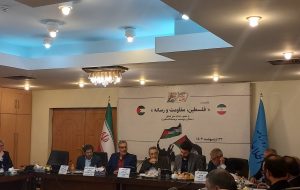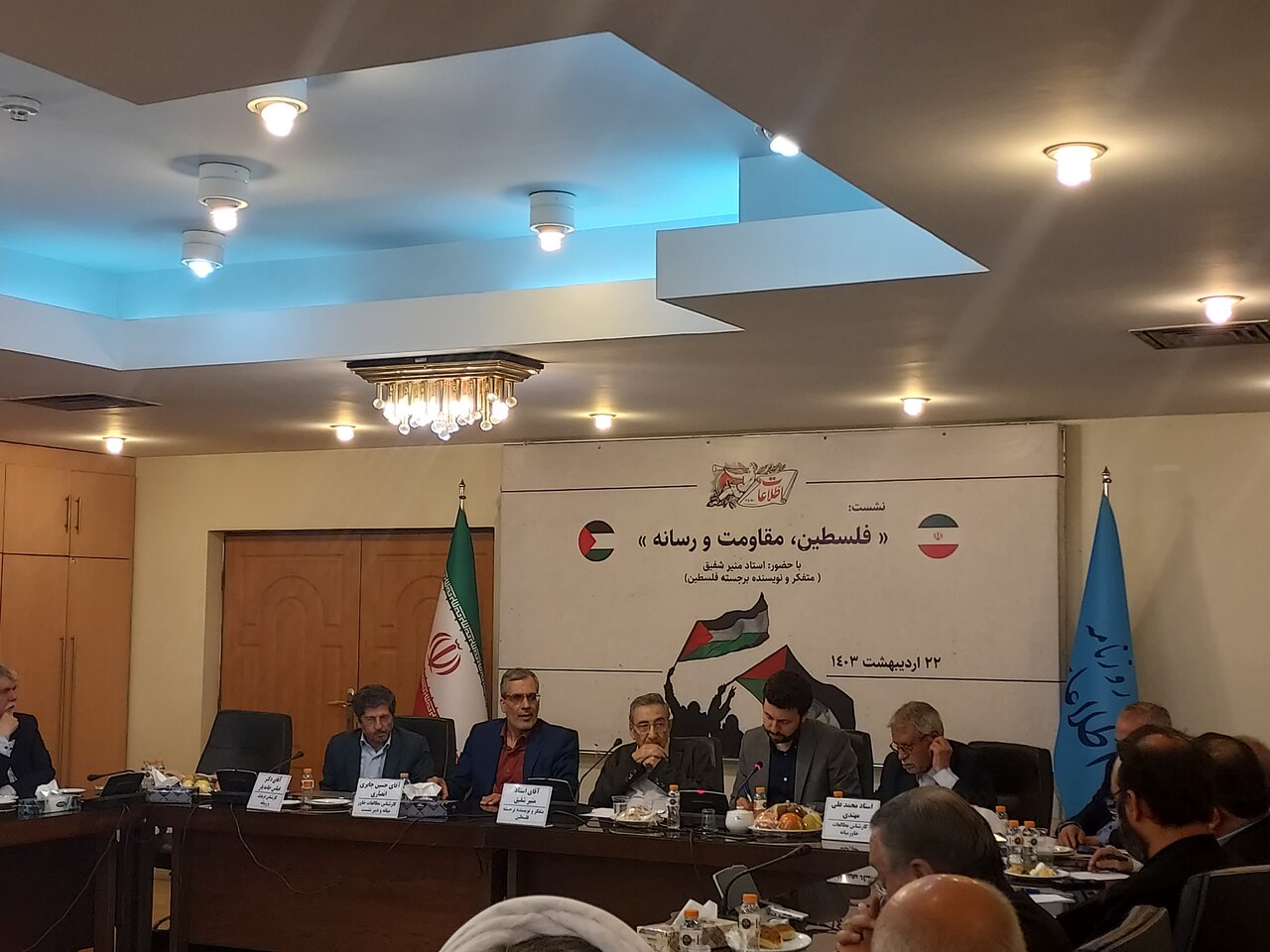Munir Shafiq: Resistance led Palestinians into total victory
TEHRAN – In a session held in Tehran on Saturday, Palestinian author Munir Shafiq took the lead in a discussion centered on “Palestine, Resistance, and Media,” accompanied by a panel of analysts. The session carried considerable weight, with Shafiq’s longstanding dedication to the Palestinian cause drawing widespread attention and setting the stage for a thought-provoking


TEHRAN – In a session held in Tehran on Saturday, Palestinian author Munir Shafiq took the lead in a discussion centered on “Palestine, Resistance, and Media,” accompanied by a panel of analysts.
The session carried considerable weight, with Shafiq’s longstanding dedication to the Palestinian cause drawing widespread attention and setting the stage for a thought-provoking exchange.
Shafiq initiated the dialogue by contextualizing the discussion within the broader framework of Palestinian Resistance, underscoring its diverse dimensions beyond mere armed conflict to include cultural, intellectual, and media aspects.
Shafiq provided insights into the ongoing situation in Gaza, stressing the fluidity and complexity of the region’s dynamics. In his analysis, Shafiq delved into the Al Aqsa Storm Operation, lauding its strategic importance and effective execution. He specifically commended the adept leadership displayed by the Resistant groups, highlighting their role in maintaining the conflict with a high degree of precision and efficacy.
Shafiq further highlighted the geopolitical context surrounding the conflict, noting the concerted efforts by Western allies of Israel to escalate tensions. Despite their intentions, Shafiq noted a significant setback for these actors, as their attempts to spark a full-scale war with Palestine were ultimately thwarted. This observation underscores the resilience and determination of Palestinian Resistance efforts, as well as the challenges faced by external actors seeking to influence the region’s dynamics.
Munir Shafiq provided a comprehensive analysis of the recent conflict, highlighting the evident dominance of the Resistance from the outset. He pointed out the Israeli military’s failure to locate Resistance strongholds, resulting in the targeting of civilians. Shafiq credited the Resistance for introducing innovative tactics that outmatched the Israeli regime across all fronts, ultimately leading to Israel’s defeat despite the significant civilian casualties.
Emphasizing the triumph of the Resistance, Shafiq noted their acceptance of ceasefire conditions, which further showcased their strategic prowess. He raised a poignant question regarding Israel’s refusal to accept peace, suggesting it stems from a reluctance to acknowledge their defeat in the conflict. Shafiq drew parallels with past instances where the United States accepted defeat in conflicts like Vietnam and Afghanistan but seem unwilling to do so in Gaza, signaling a shift in global power dynamics.
He asserted the pivotal role of media in shaping global perceptions and amplifying Palestinian voices on the international stage.
Throughout the session, Shafiq delved into the complexities of media representation, highlighting the challenges Palestinians face in shaping their narrative amidst dominant narratives that often marginalize their experiences.
Shafiq also highlighted the growing momentum of university protests across U.S. campuses, warning that Israel’s actions risk turning into a global symbol of shame. He concluded by asserting the role of resistance in Gaza as a harbinger of a new world order, despite ongoing internal strife within Palestine. Shafiq stressed the importance of prioritizing victory in the conflict before addressing post-peace plans.
The analysts present in the session also actively engaged in the discourse, probing into power dynamics within media discourse and exploring strategies for effective storytelling and advocacy.
Hossein Jaberi Ansari, a West Asia studies expert and the event’s moderator, reported on Munir Shafiq’s insightful discussion, highlighting his deep commitment to Palestine as his central focus. Shafiq delved into the aftermath of the Al Aqsa Storm Operation, addressing the plight of victims and the strategic challenges faced by Israel in the conflict.
Moreover, Jaberi Ansari emphasized the pivotal role of media in shaping narratives surrounding the Palestinian struggle. He underscored the importance of understanding the power dynamics at play in media representation and questioned the true face of Israel amidst the ongoing war of narratives.
Abbas Khameyar, a culture and media expert, provided analytical support for the Islamic revolution, emphasizing the significance of narrative warfare in the ongoing conflict. He highlighted the intense media battle surrounding the Gaza issue, noting the Zionist portrayal of themselves as victims and the propagation of falsehoods regarding events like the October 7 incident.
Amidst this asymmetric media war, Khameyar observed that media played a role even more critical than weapons, shaping perceptions and influencing public opinion. He noted Hamas’s media preparedness in response to this challenge, while also acknowledging Israeli Prime Minister Netanyahu’s labeling of media as “terroristic.”
Traditionally, Arab media outlets aligned with the Palestinian narrative, but Khameyar noted a divergence instances during the recent conflict, with some countries advocating for normalization with Israel portraying Hamas as an adversary. Internal strife within resistance groups further complicated the media landscape.
Overall, Khameyar stressed the pivotal role of media in shaping the narrative of the recent conflict, underscoring its significance in the ongoing struggle for Palestinian rights.
Mohammad-Ali Mohtadi, another West Asia studies expert, reported on the significant outcomes of the resistance in Gaza, highlighting both the military and security defeats suffered by Israel. They noted that despite Israel’s attempts to compensate for their losses since October 7, their deterrence has been severely undermined.
Moreover, Mohtadi highlighted the role of media portrayal in exposing Israeli crimes and changing the narrative surrounding the conflict. He emphasized that despite denials from the U.S. and other allies, the truth about the Zionist regime’s actions has become widely known, dismantling their false advertising over the years.
Mohtadi pointed out that Israel’s victim narrative was its biggest achievement until October 7, but this façade has now been shattered. He also drew attention to the growing advocacy for a free Palestine among university professors and students in the West, signaling a significant shift in public awareness and demand for change after years of obscured truths.
Gholamreza Montazemi, a diplomat and media expert, reported on the discussion, focusing on Munir’s assessment of the solution for Iran and the Axis of Resistance.
Additionally, Montazemi highlighted the influence of Western media in shaping the narrative surrounding the conflict, underscoring the importance of understanding Western perspectives. He pointed out that Israel’s influence extends beyond the region, with significant support and presence in Western countries.
Moreover, Montazemi noted Munir’s observation that the legitimacy of the West was challenged during the conflict, exposing the realities of Western civilization.
Palestinian death toll nears 35,000 as Israel continues its ongoing offensive on the Gaza Strip since last October, the Health Ministry in the besieged enclave said on Saturday.
